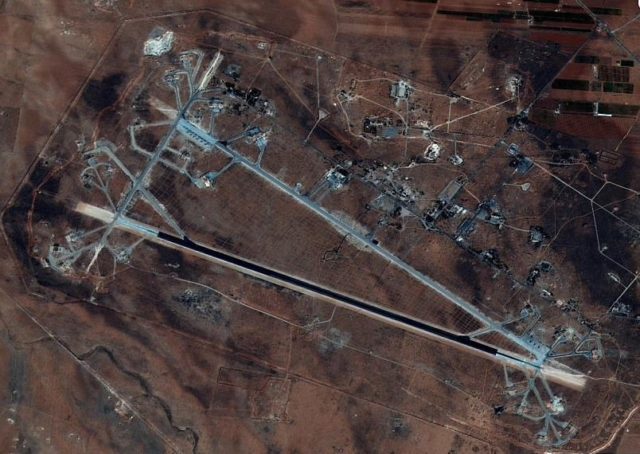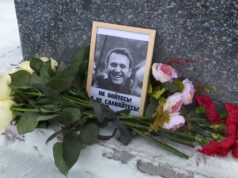The goal of American foreign policy should be to make our friends more secure and our adversaries less secure. The balance of countries then have to decide how they want to position themselves. A successful policy will have tactical goals that fit into a larger strategic picture. The American attack on Syria’s al Shayrat military air base fits squarely into the rubric.
The UK, Canada, Australia, France, Germany, Italy, Turkey, Japan, Israel, Saudi Arabia, UAE, and Poland approved publicly. So did Democrats Dick Durbin, Ben Cardin, Chuck Schumer, Elizabeth Warren, and Nancy Pelosi. Opposed were Russia, Syria, Iran, and Bolivia (keep reading). China and Sweden made statements that hedged. Among the more odd responses, Iraqi Shiite cleric Moqtada Sadr called on Assad to resign, and MSNBC host Lawrence O’Donnell called it a “false flag” operation, planned by President Trump and Vladimir Putin to help Trump prove he isn’t pro-Russian.
The first Russian response — after a furious announcement that they were tearing up the deconfliction agreement with the U.S. in Syria (they quickly thought better of it) — was to report that planes had flown from the base, so the U.S. attack had been a failure. Not so. Photos from the UK Daily Mail clearly show that hangars, fuel storage, airplanes, and service buildings were destroyed, confirming the Pentagon’s assessment. An Israeli report indicated that 58 of 59 Tomahawks hit. Flying some planes to al Shayrat and rolling them down abandoned runways is typical Russian obfuscation — the planes didn’t come from there, can’t stay there, can’t be maintained there, and can’t be refueled there. As punishment, the strike was a success.
If the tactical goal was met, what about the strategic ones? The Trump administration had announced that America’s priority in Syria would be the ouster of ISIS rather than the removal of Bashar Assad. Does the attack change that? Does it mean “regime change” is back on the table? Is the U.S. about to enter the Syrian civil war?
Not necessarily. Ambassador Haley’s comment that no political solution is possible with Assad does not mean that the U.S. is looking for a military solution. We faced a violation of international law that constituted an international emergency.
Not because of the numbers — more than 400,000 Syrians have already been killed, 11 million are displaced internally and externally, and life expectancy has declined by more than a decade. (U.S. comparables would be 5.6 million dead and 154 million total refugees – factors of 14.) Chemical weapons have been outlawed precisely because the world has generally agreed that they are uniquely hideous and terrifying. The appearance of CW threatens one of the world’s few consensus points.
Which is to say, the consensus on CW was actually shattered in 2013-14 with President Obama’s “red lines” and “game changers.” But then a different consensus coalesced around the fiction that Syrian chemical capability had been eliminated by a U.S.-Russian joint operation. Voices of disbelief were few and far between –- no one wanted to take on Putin or Obama. One result was to embolden Assad and his patrons. The past three years have seen Syrian and Russian strikes on relief convoys and civilians, including the use of chlorine –- though not nerve gas –- to pursue their campaign against Syrian Sunni Muslims.
But this is 2017 and the United States –- as the world’s only superpower –- chose to punish the perpetrator for violations of the international order that protects us all. Ambassador Haley is admirably clear. “When the United Nations consistently fails in its duty to act collectively, there are times in the life of states that we are compelled to take our own action.” Moreover, the Pentagon is now investigating Russian complicity in the attack itself or the subsequent attack on a Syrian hospital treating the victims.
The fact that the U.S. holds the presidency of the Security Council this month is serendipitous. Veto countries can veto and they will, but rotating members of the Council have choices to make. Bolivia, for example, sought permission to denounce the U.S. privately in front of the Council. Bolivia’s president, Evo Morales, has pursued an anti-American, pro-Iranian foreign policy and expelled USAID from his country in 2013. Ambassador Haley’s response put Bolivia on the spot and others on notice:
This morning, Bolivia requested an emergency UN Security Council meeting to discuss the events in Syria. It asked for the discussion to be held in closed session. The United States, as president of the Council this month, decided the session would be held in the open. Any country that chooses to defend the atrocities of the Syrian regime will have to do so in full public view, for all the world to hear.”
America’s open policy has risks. Every potential course of military or political action does, and attacking an ally of Russia and Iran certainly does. But just last week Russia offered only a half-hearted defense of its client Assad in Pravda, perhaps suggesting a way forward for the U.S. and Russia:
President Vladimir Putin’s spokesman Dmitry Peskov said in an interview that “unconditional support is not possible in this current world.” But he added that “it is not correct to say that Moscow can convince Mr. Assad to do whatever is wanted in Moscow. This is totally wrong.”
So although Putin is Assad’s support on the ground and in the UN, that support is not unconditional and Russia admits that Assad sometimes goes his own way without Russian approval. Secretary of State Tillerson’s impending visit to Moscow provides an opportunity to probe further.
Iran and North Korea may draw conclusions that are helpful or harmful and the U.S. and its allies will have to be prepared for either.
But not responding to the flagrant use of chemicals inside Syria may make the use of chemicals outside Syria not unthinkable –- a shell aimed at Israel, for example. Not responding to loathsome and illegal Syrian behavior may make the transfer of chemical capabilities to Hizb’allah by the Syrian government not unthinkable. Both of those would touch Israel’s stated “red lines” and risk widening the war considerably.
Any further military action against the Syrian regime by the United States could be necessitated by choices made by Assad, but the mission we undertook -– a proportionate and appropriate punishment for an international war crime -– has been accomplished. Perhaps the administration could make just one more statement:
The Syrian Ministry of Defense is next if necessary. Your call.






